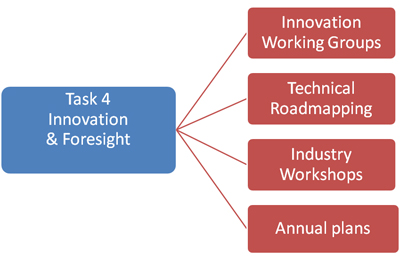Innovation and Foresight Working Groups
(ABER, FMI, Thales Alenia France)
Task 4 brought together the EPN2020-RI Industry Officer along with science and industrial teams to promote the innovation that is inherent in space activities because of the challenging environments they work in. The very existence of a structured community of European planetary scientists is of considerable added value for the European industry, not only for the large companies of the space sector but even more importantly for SMEs and non-space industry, which must identify relevant interlocutors. Identifying a market is vital in order to invest in technology. For an SME or for a larger non-space company, assessing opportunities for planetary science applications remains a challenge. The technical foresight will help to identify specific topics relevant to SMEs.
Task 4 delivered two thematic workshops per year with participants from industry and academia. Outcomes from WSs were rapidly disseminated to build industry involvement in later years. Task 4 resulted in:
Technology foresight
- bring together science and industrial teams to promote the innovation that is inherent in space activities because of the challenging environments they work in.
- Added value for the European industry, not only for the large companies of the space sector but even more importantly for SMEs and non-space industry
- Identifying a market is vital in order to invest in technology. For an SME or for a larger non-space company, assessing opportunities for planetary science applications remains a challenge.
- Two thematic workshops per year with participants from industry and academia. Outcomes from WSs will be rapidly disseminated to build industry involvement in later years.
- Topical Working Groups with participants from planetary science groups, SMEs and other industrial partners to promote innovation in planetary science (with SMEs);
- Workshops on innovative instrumentation for planetary missions. The specific new observational challenges suggested by the scientific groups will be assessed in the light of existing technological possibilities, and the need/cost of new instrumentation development
- Workshops on cooperation between EUROSPACE and the European planetary science academia. (EUROSPACE -www.eurospace.org is the trade association of the European Space Industry
Technology foresight workshops
- The European planetary community lacks a clear path for identifying the technology needed for future planetary exploration, where European instrument capabilities can be married to planetary exploration science requirements.
- We also lack a way of responding to our stakeholders in industry. Will to promote innovative measurement techniques in forthcoming planetary science/missions, with commercial and industrial companies including SMEs;
- We organise a series of workshops aimed at identifying roadmaps for key technologies
- Previous Examples:
- Planetary Robotics
- Planetary Cartography
- Detectors for Planetary Science
- Previous Examples:
Roadmap questions
- What are the major science drivers for the next 20 years? (i.e. from now to 2030)
- How will science instrumentation change over the next 20 years?
- What method swill we need to address these science challenges (Resolution, radiation Hardness, readout speed etc.)?
- What are the priority technologies that we must invest in now to meet these future science challenges?
- What are the priority constituent technologies that we must invest in now to meet these future science challenges? (e.g. materials technology, computing, etc.)
- Are there nearer term technologies that we can significantly improve, and how?
- What will the planetary technology road-maplook like from now to 2030?

WP4 Related Workshops
- 13 -15 Sept 2016, Bern. ISSI-EPN forum on the "key questions in planetary science for the next 50 years" will explicitly address the key technologies required. There was a final tech dedicated session, the day after the two science days. For more information contacts Michel Blanc, Manuel Grande (michel.blanc(at)irap.omp.eu, m.grande(at)aber.ac.uk)
- 21-23 Sept 2016, Luxemburg. ASIME Asteroid mining addressed the scientific inputs needed to enable this technology. For more information contacts Amara Graps, Manuel Grande (graps(at)psi.edu, m.grande(at)aber.ac.uk)
- 24-27 Oct 2016, Pasadena. IWIPM-3 is the annual US technology foresight meeting, arranged this year to coincide with the EPSC-DPS joint meeting in Pasadena. It featured a Europlanet branded panel discussion, and we will support the presence of European technology providers. For more information contact Manuel Grande (m.grande@aber.ac.uk)
- 14-18 Nov 2016, Antwerp. Space weather and radiation design (in conjunction with PSWS). A workshop proposal has been accepted by the European Space Weather week (ESSW), the leading venue for commercial space weather providers in Europe. For more information contact Manuel Grande (m.grande(at)aber.ac.uk)
- Towards a Moon Village: Technology foresight workshop, EPSC 2017, Riga, Latvia For more information contact Bernard Foing (Bernard.Foing@esa.int), Manuel Grande (m.grande(at)aber.ac.uk)